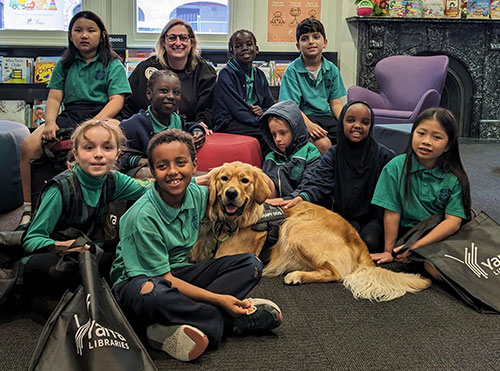
Our Blog
5 Ways Dog-Assisted Interactions Can Support Students with Anxiety in School

At Canine Comprehension, we deeply understand the critical role of emotional well-being in a child's academic ability. As a team dedicated to supporting school communities and students alike, we recognise that addressing anxiety is paramount in creating a conducive learning environment where every child can reach their full potential. We can empower students to overcome their anxieties and confidently embrace learning by fostering a positive and supportive atmosphere, allowing them to flourish inside and outside the classroom. With this in mind, here are 5 Ways we believe Dog-Assisted Interactions can support students with anxiety.
Emotional Support:
Dogs provide unconditional love and companionship, offering comfort and reducing feelings of loneliness or isolation often associated with anxiety. Their presence can create a calming effect and offer a sense of security for anxious children.
Stress Reduction:
Interacting with therapy dogs has been shown to reduce cortisol levels, the stress hormone, in both children and adults. Petting, playing, or simply being in the presence of a dog can promote relaxation and alleviate anxiety symptoms.
Increased Socialisation:
Dogs can serve as a bridge for social interaction, making it easier for children with anxiety to engage with others. Activities involving therapy dogs, such as group sessions or dog-assisted reading programs, encourage communication and teamwork, fostering social skills and confidence.
Distraction and Coping Mechanism:
Engaging with dogs in structured activities can provide a healthy distraction from anxious thoughts or situations. Activities like grooming, walking, or training sessions offer opportunities for mindfulness and can help children develop effective coping strategies for managing their anxiety.
Promotion of Mindfulness:
Interacting with dogs encourages children to be present at the moment, focusing their attention on the here and now rather than worrying about the past or future. Mindful interactions with therapy dogs, such as practising deep breathing or observing the dog's behaviour, can teach children valuable mindfulness techniques to manage their anxiety.
By incorporating dog-assisted therapy into school environments, educators and mental health professionals can provide valuable support to children struggling with anxiety, promoting emotional well-being and resilience.
